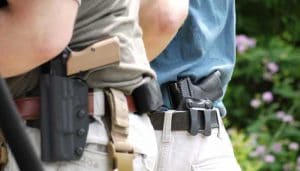The Supreme Court recently denied a slew of gun-rights challenges focused on everything from state “assault weapons” bans to safety requirements and permit issues, sparking a blistering dissent from Justice Clarence Thomas who accused his fellow justices of “looking the other way” on Second Amendment cases.
Supporters of the Second Amendment were hoping that the Supreme Court would take up at least some of the legal challenges to gun-control laws that have passed in New Jersey, California, Maryland, and Massachusetts. Those cases were denied certiorari, meaning the Supreme Court will not review them.
The lack of action sparked some justices to dissent. Justice Clarence Thomas slammed his colleagues for refusing to take up Rogers v. Grewal, a challenge to New Jersey’s gun-carry law that allows government officials to subjectively deny permits. Thomas—joined by Justice Brett Kavanaugh—said the state government’s requirement that residents provide a reason for exercising a constitutional right warranted judicial oversight.
The questions presented by Rogers v. Grewal are outlined in the petition to the Supreme Court as follows:
In District of Columbia v. Heller, this Court held that the Second Amendment protects “the individual right to possess and carry weapons in case of confrontation,” 554 U.S. 570, 592 (2008), and in McDonald v. City of Chicago, it determined that this right “is fully applicable to the States,” 561 U.S. 742, 750 (2010). The Courts of Appeals for the District of Columbia and Ninth Circuits have concluded that the right to carry a firearm extends outside the home and that licensing restrictions that require citizens to show a special need for carrying a firearm effectively “destroy[ ] the ordi-narily situated citizen’s right to bear arms” and there-fore are categorically unconstitutional. Wrenn v. District of Columbia, 864 F.3d 650, 666 (D.C. Cir. 2017); accord Young v. Hawaii, 896 F.3d 1044, 1074 (9th Cir. 2018). By contrast, the court below, along with the First, Second, and Fourth Circuits, have upheld sub-stantively indistinguishable licensing restrictions un-der a watered-down “intermediate scrutiny” analysis.
The questions presented are:
1.Whether the Second Amendment protects the right to carry a firearm outside the home for self- defense.
2.Whether the government may deny categorically the exercise of the right to carry a firearm outside the home to typical law-abiding citizens by condition-ing the exercise of the right on a showing of a special need to carry a firearm.
In response to the Supreme Court’s denial of review, Justice Thomas wrote the following:
JUSTICE THOMAS, with whom JUSTICE KAVANAUGH joins as to all but Part II, dissenting from the denial of certiorari. The text of the Second Amendment protects “the right of the people to keep and bear Arms.” We have stated that this “fundamental righ[t]” is “necessary to our system of ordered liberty.” McDonald v. Chicago, 561 U. S. 742, 778 (2010). Yet, in several jurisdictions throughout the country, law-abiding citizens have been barred from exercising the fundamental right to bear arms because they cannot show that they have a “justifiable need” or “good reason” for doing so. One would think that such an onerous burden on a fundamental right would warrant this Court’s review. This Court would almost certainly review the constitutionality of a law requiring citizens to establish a justifiable need be-fore exercising their free speech rights. And it seems highly unlikely that the Court would allow a State to enforce a law requiring a woman to provide a justifiable need before seek-ing an abortion. But today, faced with a petition challenging just such a restriction on citizens’ Second Amendment rights, the Court simply looks the other way.





